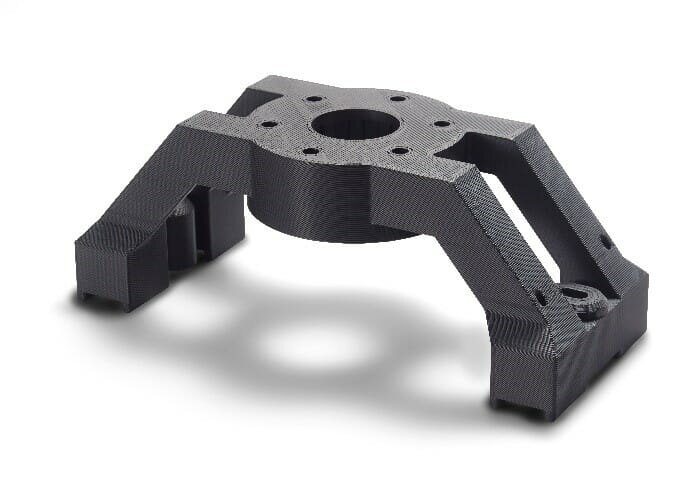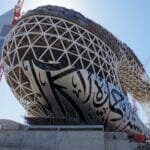New High Performance Thermoplastics Drive 3D Printed Tools and Parts
Capable of Meeting Complex Manufacturing, Automotive and Aerospace Requirements
EDEN PRAIRIE, Minn. & REHOVOT, Israel, Oct. 22, 2019 – Addressing the growing demands of engineers and designers to deliver production-grade, custom 3D-printed tooling and parts, Stratasys (NASDAQ: SSYS) unveiled several new durable, temperature and chemical resistant FDM® thermoplastics. Meeting the specific requirements of 3D printed applications in manufacturing, these materials can accommodate high temperatures and challenging requirements common on the production floor.
Materials introduced today include Antero™ 840CN03 for the Stratasys Fortus® F900™ 3D printer, and Diran™ 410MF07 and ABS-ESD7™ for the Stratasys F370™ 3D printer. Each of these thermoplastics are well-suited to handle the requirements of manufacturing applications in industries such as automotive and aerospace to engineer advanced 3D printed jigs and fixtures, tooling, prototypes and production parts.
Developed for the F900 3D printer, Antero 840CN03 is the second PEKK-based polymer now offered by Stratasys in its portfolio of proprietary Antero™ high performance polymers – and leveraging the Kepstan® PEKK technology from Stratasys strategic supplier Arkema. The new Antero material is formulated to create highly customized tooling and parts with consistent electrostatic discharge (ESD) performance, and is ideal for printing high temperature- and chemical-resistant parts with ultra-low outgassing and exceptional wear properties.
Suited for aerospace and industrial applications, the new Antero material with ESD properties can create strong yet lightweight parts used in frames, panels and components. The material is also being added by Stratasys Direct Manufacturing, the company’s contract manufacturing division – as part of its comprehensive material offerings.
“Manufacturing spacecraft poses intense material challenges in the development of parts that exhibit the right attributes,” said Brian Kaplun, Senior Manager for Advanced Manufacturing, Lockheed Martin Space. “One of those challenges is getting the right ESD or electrostatic dissipative properties, among other physical and mechanical characteristics. Stratasys Antero ESD fits our needs for outgassing and electrostatic dissipative properties in a strong but lightweight additive manufacturing material.”
Built for highly durable tooling applications, Diran is a nylon-based material formulated by Stratasys and offered for the Stratasys F370 printer. The new FDM thermoplastic gives manufacturers extreme toughness and low friction – combined with resistance to hydrocarbon-based chemicals and a smooth surface to offer low sliding resistance. Diran’s toughness is able to withstand the rough handling of tools often common in a manufacturing setting.
The ABS-ESD7 thermoplastic, previously only available on the Stratasys Fortus printers, is built for static-sensitive applications to prevent discharge or attraction to other materials like powders, dust and fine particles. Extending factory floor materials to the Stratasys F370 3D printer, users can capitalize on prototyping and production requirements for low cost and highly customizable parts. Delivering an affordable, ESD-safe material on a platform dedicated to ease-of-use, repeatability and part accuracy, ABS-ESD7 is ideal for manufacturing tooling applications.
“We see growing adoption of 3D printing in production environments, yet engineers and designers struggle with thermoplastics that just can’t match the extreme requirements of manufacturing-based applications,” said Adam Pawloski, Vice President of Manufacturing Solutions at Stratasys. “Our thermoplastics can remove these barriers to accelerate adoption of 3D printing in manufacturing settings, allowing users to design and create faster, while minimizing costs often associated with traditional approaches.”
For more information on the power of Stratasys materials in high-performance, manufacturing-led environments – please visit our Antero, Diran and ABS-ESD7 materials pages.
Stratasys is a global leader in additive manufacturing or 3D printing technology and is the manufacturer of FDM® and PolyJet™ 3D printers. The company’s technologies are used to create prototypes, manufacturing tools, and production parts for industries, including aerospace, automotive, healthcare, consumer products and education. For 30 years, Stratasys products have helped manufacturers reduce product-development time, cost, and time-to-market, as well as reduce or eliminate tooling costs and improve product quality. The Stratasys 3D printing ecosystem of solutions and expertise includes: 3D printers, materials, software, expert services, and on-demand parts production. Online at: www.stratasys.com, https://blog.stratasys.com and LinkedIn.
Stratasys, FDM, Antero, Diran, ABS-ESD7, Fortus, F900, and F370 are trademarks or registered trademark of Stratasys Ltd. and/or its affiliates. All other trademarks are the property of their respective owners, and Stratasys assumes no responsibility with regard to the selection, performance, or use of these non-Stratasys products.
Notice Regarding Forward Looking Statements
The statements in this press release relating to Stratasys’ beliefs regarding the benefits consumers will experience from Stratasys Antero, Diran and ABS-ESD7 and Stratasys’ expectations on the timing of delivery of Antero, Diran and ABS-ESD7 are forward-looking statements reflecting management’s current expectations and beliefs. These forward-looking statements are based on current information that is, by its nature, subject to rapid and even abrupt change. Due to the risks and uncertainties associated with Stratasys’ business, actual results could differ materially from those projected or implied by these forward-looking statements. These risks and uncertainties include, but are not limited to: the risk that consumers will not perceive the benefits of Antero, Diran or ABS-ESD7 to be the same as Stratasys does; the risk that unforeseen technical or other difficulties will delay delivery of Antero, Diran or ABS-ESD7; and other risk factors set forth under the caption “Risk Factors” in Stratasys’ most recent Annual Report on Form 20-F, filed with the Securities and Exchange Commission (SEC) on March 7, 2019. Stratasys is under no obligation (and expressly disclaims any obligation) to update or alter its forward-looking statements, whether as a result of new information, future events or otherwise, except as otherwise required by the rules and regulations of the SEC.





